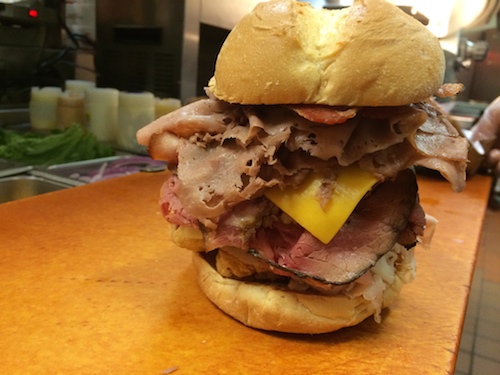The internet likes nothing better than a stunt food, so Arby’s Meat Mountain has gotten a lot of coverage over the last two weeks. Over at Slate, however, LV Anderson wonders whether the ostensibly grassroots demand for this wad of processed protein wasn’t manufactured by corporate. First of all, this story on whether people really want a particular Arby’s menu item appears in Slate’s “Brow Beat” section, ostensibly devoted to high culture. That’s not the kind of high I thought they meant. Second, a technical note: because possessive nouns are difficult to pluralize in American English, this post will use the generally accepted plural of Arby’s, “landfills.”
Hear the legend of Meat Mountain, as related by Arby’s Manager of Public Engagement, Jason Rollins:
Customers actually began requesting the sandwich with our team members, who in an effort to always “make it right” (our service mantra) with the customer; made the sandwich. We began hearing from our restaurants and fans in social that it was emerging as a secret menu item, so we let our restaurants know about it in case they were asked.
The word “actually” is to an untrue anecdote as that chemical that smells like rotten eggs is to natural gas. Ostensibly, Arby’s had no intention of selling a nine-inch stack of meat and cheese to its customers, and only put up posters of all its meats arranged in a stack to, you know, express its commitment to meat. But then, without even trying to sell a sandwich, the chain found itself deluged with customer demand.
Anderson is skeptical of this account. The plot thickens when she tries to interview teenage Arby’s employees on Twitter—an act of reportage equivalent to a sandwich that combines all known meats—and learns that discussing the Meat Mountain with writers is “grounds for termination.”
In case you were wondering about the state of American employment in 2014, kids who work at Arby’s have to sign confidentiality agreements. Regardless, Arby’s has been pretty forthcoming about their “secret menu item.” For example, the restaurant chain approached the Washington Post for its article about the Meat Mountain and not, as Anderson notes, the other way around.
The viral quality of this story seems to be a reaction to the audacity of Meat Mountain, not some vast public demand for history’s least kosher food. But even if Arby’s did commit a clever act of astroturfing, there is something about the narrative that has captured public imagination. Three reader responses suggest themselves:
- I can’t believe that Arby’s is selling this.
- I can’t believe that people want to eat this.
- I can’t believe the Washington Post is covering menu items at Arby’s.
I submit that in a mere two weeks, the Meat Mountain narrative has passed through all of these audience reactions, with the chain’s PR team acting as an intratextual spectatorial model.
The claim that Meat Mountain began as a “secret menu item”—something Arby’s felt compelled to make but for some reason did not want to sell—encourages us to think that the sandwich is absurd. By implying that they considered Meat Mountain too crazy to go on the menu, Arby’s models for us reaction (1). By telling us they were overwhelmed by spontaneous customer demand, the chain’s PR team goes on to model reaction (2). And now, two weeks into our ongoing coverage of a humorous food, Anderson’s meta-story brings us to reaction (3).
So that is the story of Meat Mountain, a sandwich we want to think of ourselves as wanting to eat. Who knows where this tale will go next? Probably to the bathroom for forty minutes—but where beyond that? Will the President eat Meat Mountain? Will Vine be overrun with videos of teens ramping it? Will the sandwich be diagrammed by the nerds of Bing Bong Theory, thus consolidating the critical moron demographic? Only Arby’s knows for sure, followed a few days later by the Washington Post.




